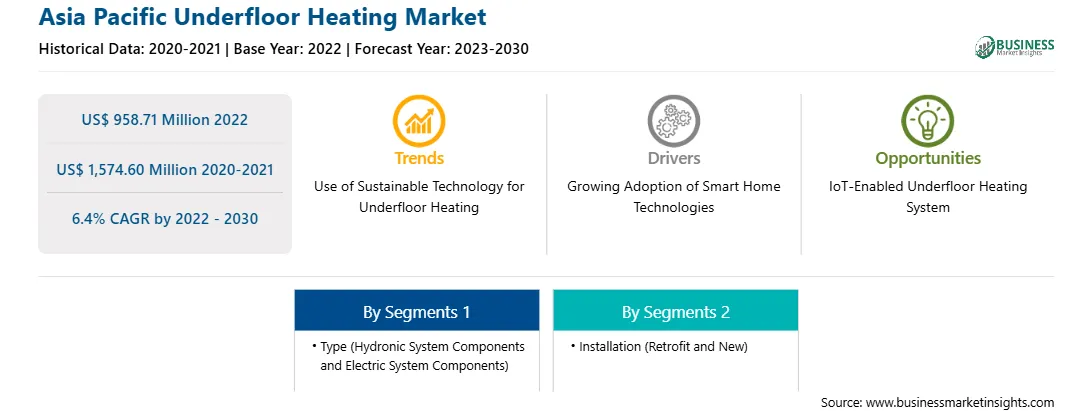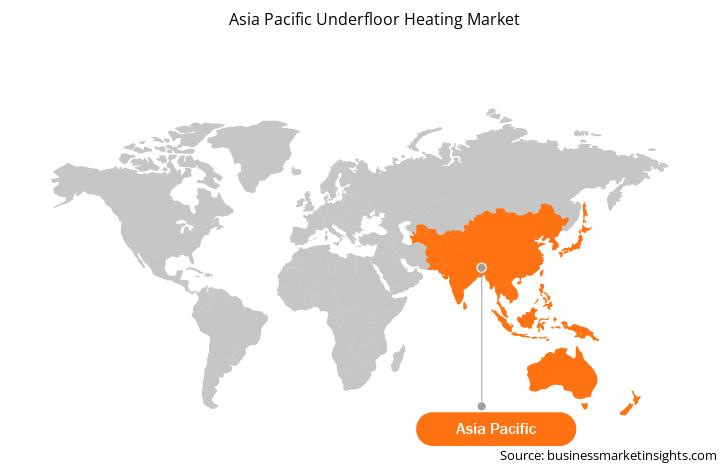2030년까지 아시아 태평양 바닥난방 시장 예측 - 지역 분석 - 유형별(수압식 시스템 구성요소 및 전기 시스템 구성요소), 설치(개조 및 신규), 애플리케이션(주거용 및 상업용)별
No. of Pages: 118 | Report Code: BMIRE00030390 | Category: Electronics and Semiconductor
No. of Pages: 118 | Report Code: BMIRE00030390 | Category: Electronics and Semiconductor
Strategic insights for Asia Pacific Underfloor Heating involve closely monitoring industry trends, consumer behaviours, and competitor actions to identify opportunities for growth. By leveraging data analytics, businesses can anticipate market shifts and make informed decisions that align with evolving customer needs. Understanding these dynamics helps companies adjust their strategies proactively, enhance customer engagement, and strengthen their competitive edge. Building strong relationships with stakeholders and staying agile in response to changes ensures long-term success in any market.

| Report Attribute | Details |
|---|---|
| Market size in 2022 | US$ 958.71 Million |
| Market Size by 2030 | US$ 1,574.60 Million |
| Global CAGR (2022 - 2030) | 6.4% |
| Historical Data | 2020-2021 |
| Forecast period | 2023-2030 |
| Segments Covered |
By 유형
|
| Regions and Countries Covered | 아시아 태평양
|
| Market leaders and key company profiles |
The regional scope of Asia Pacific Underfloor Heating refers to the geographical area in which a business operates and competes. Understanding regional nuances, such as local consumer preferences, economic conditions, and regulatory environments, is crucial for tailoring strategies to specific markets. Businesses can expand their reach by identifying underserved regions or adapting their offerings to meet regional demands. A clear regional focus allows for more effective resource allocation, targeted marketing, and better positioning against local competitors, ultimately driving growth in those specific areas.

1. Danfoss AS.
2. Emerson Electric Co.
3. nVent Electric Plc.
4. Watts Water Technologies Inc.
5. Robert Bosch GmbH.
6. Resideo Technologies Inc.
7. Uponor Corp.
8. REHAU Ltd.
9. Schneider Electric SE.
The Asia Pacific Underfloor Heating Market is valued at US$ 958.71 Million in 2022, it is projected to reach US$ 1,574.60 Million by 2030.
As per our report Asia Pacific Underfloor Heating Market, the market size is valued at US$ 958.71 Million in 2022, projecting it to reach US$ 1,574.60 Million by 2030. This translates to a CAGR of approximately 6.4% during the forecast period.
The Asia Pacific Underfloor Heating Market report typically cover these key segments-
The historic period, base year, and forecast period can vary slightly depending on the specific market research report. However, for the Asia Pacific Underfloor Heating Market report:
The Asia Pacific Underfloor Heating Market is populated by several key players, each contributing to its growth and innovation. Some of the major players include:
The Asia Pacific Underfloor Heating Market report is valuable for diverse stakeholders, including:
Essentially, anyone involved in or considering involvement in the Asia Pacific Underfloor Heating Market value chain can benefit from the information contained in a comprehensive market report.